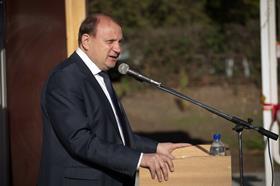
Apricots, cherries, and new varieties of apples and pears as well as walnuts and other high-value fresh fruits have been planted by growers in Moldova in an effort to create new sales opportunities and to reduce the country’s traditional dependency on Russia.
And the timing of this push could not be better, with the news that MEPs have voted to open the EU market to limited volumes of Moldovan apples, grapes and plums – a move designed to compensate Moldova's producers for their losses due to Russia’s ban on imports of their produce.
Peter White, a former vice-president of sales and marketing at Fresh Del Monte North America, is now employed by US consulting company Development Alternatives Incorporated (DAI), an organisation that is looking to lead the export diversification drive in Moldova.
'Understandably there is an attachment here to the Russian market,” White explains. “But this reliance on Russia has brought its own problems. Growers haven’t had the connection to the market that they need, and we’ve now got to change that.”
Moldova’s diversification effort enjoys the enthusiastic support of the agriculture minister. Vasile Bumacov, a highly respected academic at Moldova’s leading university and with solid business experience in agriculture in Europe and the United States, believes that Moldovan growers have a real opportunity to make a difference in new markets.
“Trade with Russia has reduced grower income,” Bumacov explains. “It’s because it depends so much on bribes and backhanders. Growers need to realise there is no future like this. Once they deal in new markets in Europe they’ll see how they can grow their returns simply by removing these additional costs.”
Moldova used to be something of a fruit basket for the former Soviet Union, producing relatively large quantities of apples, summerfruits, nuts, dried fruits and wine for shoppers in Moscow, St Petersburg, and Russia’s other major cities.
The trading links with Russia remains strong, but Moldova’s decision in August to sign an association agreement with the European Union means that its exporters had been labouring under the same ban imposed by Moscow on the EU, the US, and others. The EU's decision this week, however, should help to ease some of that pressure.
For the full story on Moldova's diversification plans, see the upcoming January 2015 issue of Eurofruit






No comments yet